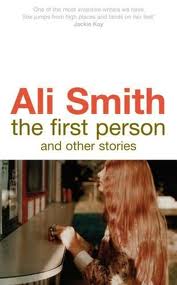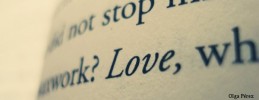
photo by Sara Sánchez
by Emma Young
Ali Smith is one of the most distinctive and innovative voices on the literary scene today. Her five novels and four collections of short stories have seen her achieve outstanding success and have placed her at the forefront of contemporary British fiction. It is Smith’s focus and attention to voice that marks her out as a unique writer. In an interview with Kasia Boddy in 2010, Smith remarked ‘Dialogue is absolutely life. The whole of life happens in dialogue’. It is this belief in dialogue that results in the vibrant depictions of character and self in Smith’s stories and which has allowed her to challenge contemporary notions of identity. Inspired by writers including Katherine Mansfield and Grace Paley, Smith self-consciously writes within a literary tradition of successful female short story writers and has adapted the form to suitably voice the issues of today.
 Smith published her first collection of short stories, Free Love, in 1995. This collection won a Scottish Arts Council Award and the Saltire Society Scottish First Book of the Year Award. Despite her hesitations and scepticism about literary prizes and awards since this first publication, Smith has never been short of accolades. Amongst others, she received the 2001 Arts Foundation Award for Short Story Writing, and has been shortlisted for both the Orange Prize for Fiction and the Booker Prize.
Smith published her first collection of short stories, Free Love, in 1995. This collection won a Scottish Arts Council Award and the Saltire Society Scottish First Book of the Year Award. Despite her hesitations and scepticism about literary prizes and awards since this first publication, Smith has never been short of accolades. Amongst others, she received the 2001 Arts Foundation Award for Short Story Writing, and has been shortlisted for both the Orange Prize for Fiction and the Booker Prize.
As Smith’s writing career has progressed it has been her work in the novel form, rather than her short story collections, that has received the critical attention and acclaim, regardless of her continual production and championing of the short story. In her latest collection of short stories, The First Person and Other Stories, it is with ‘True Short Story’ that Smith engages with the genre in her most unique and honest debate about the form to date. A story inspired by a speech given by Alex Linklater, in the narrative the autobiographical figure of ‘Ali’ phones her friend Kasia to discuss a conversation she has overhead in a café between two men in which they describe the novel as ‘a flabby old whore’. The story then traces the discussion between Ali and Kasia about the short story and concludes with quotations from Nadine Gordimer, Franz Kafka, Elizabeth Bowen and Alice Munro amongst other prominent short story writers. ‘True Short Story’ is representative of Smith’s style as it contains many of the characteristics and traits that define her fiction. The playfulness of the voice is ever present and it constantly remains self-reflexive and suggestive. The story also contains a double meaning, or double focus, as whilst on the one hand Smith is inwardly reflecting upon debates surrounding the genre, the outward narrative also focuses on Kasia’s battle with breast cancer and the campaign to have Herceptin made available on the NHS. Likewise, the ambiguity in the title over what Smith means by ‘true’ short story – is it a factually accurate story or one true to the genre itself – demonstrates the playful manner in which she seeks to challenge and engage the reader.
 Ambiguity is a theme that runs throughout all of Smith’s short story collections and it is arguably the characteristic that best defines her treatment of character and self. In the first story ‘Free Love’, in the collection of the same title, the young female protagonist discovers a prostitute in Amsterdam who offers ‘Love for men also women’. The narrative remains ambiguous initially as to the protagonists’ gender, which allows Smith to subvert the expected depiction of a young man losing his innocence to a prostitute and instead narrate the sexual lesbian awakening of a teenage girl. Gender ambiguity is the central conceit of The Whole Story and Other Stories in which the ‘I’ and ‘you’ pronouns remain un-gendered throughout the collection. In doing so Smith asks the reader to decide whether they are reading stories about heterosexual or homosexual love and in the process deconstructs the binary itself by revealing the universal nature of love and sex. It is this playful and self-conscious approach to the short story that has allowed Smith to revolutionize the short story and keep it vividly alive in the twenty-first century. Her engagement with postmodern literary techniques and feminism has seen her produce stories that challenge the hetero-normative and patriarchal constructs of identity, to offer the reader instead a more open and pluralistic notion of self.
Ambiguity is a theme that runs throughout all of Smith’s short story collections and it is arguably the characteristic that best defines her treatment of character and self. In the first story ‘Free Love’, in the collection of the same title, the young female protagonist discovers a prostitute in Amsterdam who offers ‘Love for men also women’. The narrative remains ambiguous initially as to the protagonists’ gender, which allows Smith to subvert the expected depiction of a young man losing his innocence to a prostitute and instead narrate the sexual lesbian awakening of a teenage girl. Gender ambiguity is the central conceit of The Whole Story and Other Stories in which the ‘I’ and ‘you’ pronouns remain un-gendered throughout the collection. In doing so Smith asks the reader to decide whether they are reading stories about heterosexual or homosexual love and in the process deconstructs the binary itself by revealing the universal nature of love and sex. It is this playful and self-conscious approach to the short story that has allowed Smith to revolutionize the short story and keep it vividly alive in the twenty-first century. Her engagement with postmodern literary techniques and feminism has seen her produce stories that challenge the hetero-normative and patriarchal constructs of identity, to offer the reader instead a more open and pluralistic notion of self.
Although it has been Smith’s novels that have accumulated the most prestigious awards and prizes, it is for her work championing the short story in which Smith’s heritage lies. It is the openness and power of the short story that captures her imagination. As she said in her interview with Boddy regarding the short story, ‘It’s a bit like looking at the universe through a single telescope. You can bring absolutely everything into this single connection’.


2 thoughts on “Author Profile: Ali Smith”
Comments are closed.